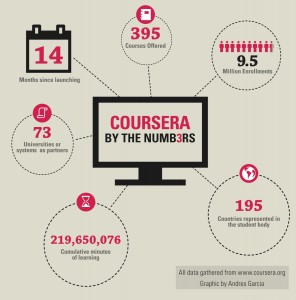 Hundreds of distinguished professors from 73 universities like Rice, Princeton and Yale are contributing to the 395 massive open online courses Coursera offers.
Hundreds of distinguished professors from 73 universities like Rice, Princeton and Yale are contributing to the 395 massive open online courses Coursera offers.
When UH announced an agreement with Coursera in May, several UH professors joined those ranks and are contributing to select courses.
“There are a number of faculty members who are currently creating exciting MOOCs in a variety of areas, from the history of human space flight to the programing of handheld devices,” said Jeff Morgan, interim associate provost for education and technology innovation.
“At present, none of these are courses taught at the University of Houston, although a few of them are related to courses that we teach.”
The contribution will allow eager learners all around the world to experience an education for free — and for college credit in some cases, Morgan said. In addition, some of the learning materials will become supplements to kindergarten through 12th grade education worldwide.
Ioannis Pavlidis, professor and director of the Computational Physiology Lab in the Department of Computer Science, leads an instructional team creating a course for Coursera in ubiquitous computing and supports a team creating a course in science ethics. Pavlidis finds teaching for the web vastly different than in the classroom.
“There is need for a lot more visuals, think YouTube. There is need for formulating quizzes and problems for mass online delivery, ensuring effectiveness and fairness; and there is need to incorporate some sort of discussion and interaction via social media,” Pavlidis said.
“A great challenge — to which no one has an answer right now — is to engage and maintain some modicum of personal connection with thousands of people you never met or saw.”
Both of the courses Pavlidis is contributing to are expected to go live in the Coursera program in Spring 2014.
Despite the different learning and teaching techniques necessary when working with MOOCs, Pavlidis said the transition to online learning has more perks than disadvantages.
“There are always good things and bad things with every transformation that the society undergoes. Overall, the balance is usually positive, and I think this will be the case with MOOCs,” he said.
“You can compare the MOOCs’ benefits to students with the benefits Internet shopping brought to consumers. We still go to the mall for some specialty items, but a lot of commodity items we prefer to order online. Beyond that, MOOCs (are) likely to instill a healthy competition in the instruction world.”
news@thedailycougar.com
